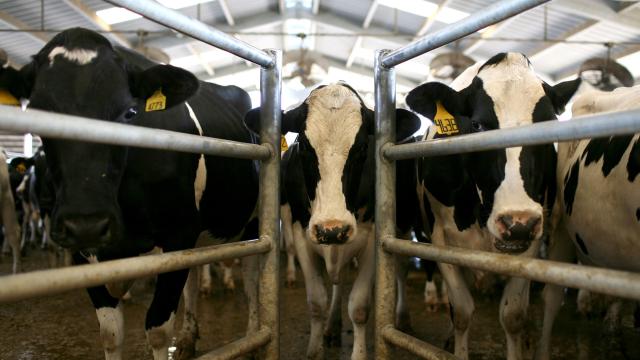Burger King just launched a low-methane Whopper, made by changing cows’ diets, with a super cringe ad campaign. It’s meant to be a small fix for a serious problem: Methane has a short-term heating effect 84 times more potent than carbon dioxide.
But it can’t be the only effort to stem methane (it’s also wholly inadequate, which we’ll get to in a bit). New research found that global emissions have reached an all-time high, and agriculture ” especially animal agriculture ” is largely to blame. The research, conducted by Stanford University’s Global Carbon Project and published in Earth System Science Data and Environmental Research Letters on Wednesday, found global annual methane emissions increased 9 per cent from 2000 to 2017.
In terms of warming potential, those additional methane emissions are akin to doubling the total carbon dioxide emissions of Germany or France. More than half of those emissions come from human activities, including the fossil fuel industry, which is responsible for about a third of anthropogenically produced methane. We need to curb methane emissions from the oil and gas sector by slapped down the Trump administration’s proposed rollback of a methane regulation. An even bigger source of methane emissions, though, is agriculture.
The biggest sources of agricultural methane emissions is raising ruminants, a type of mammal that includes cows and sheep. In the U.S., beef production is responsible for over a third of agriculture-related emissions, and most of that is from the methane that cows release by burping.
It’s the emissions from cow burps that Burger King says it’s aiming to tackle with their new low-methane Whopper. The company said it can reduce a cow’s daily methane impact by about 33% by adding lemongrass to the animals’ diet. But Jan Dutkiewicz, a postdoctoral fellow at Concordia University and visiting fellow in the Animal Law and Policy Program at Harvard University, said that figure is hugely misleading and based on research conducted by Restaurant Brand International, Burger King’s parent company as opposed to being peer-reviewed. In addition, the research says the 33% figure actually only applies to the year-long or so fattening period when a cow is taken to a feedlot to prepare for slaughter, not its entire life.
“That’s actually only a really small part of the cow’s life,” Dutkiewicz told Gizmodo. “So if you’re reducing methane emissions during only that period 33% … that’s nowhere near as significant, that’s snake oil.”
Studies have found that changing cow diets can reduce methane emissions to an extent. There’s evidence that adding a chemical compound called 3-nitrooxypropanol to livestock feed reduces methane emissions in sheep and cattle up to 30%. One study found that feeding cows algae can make an even bigger difference, reducing the methane they emit by up to 60%. None of these options have been proven to work at scale, but there is potential to apply them more broadly.
Beyond beef, there are also still other major sources of methane the world’s farms need to get under control. Kari Hamerschlag, the deputy director of Friends of the Earth food program, told Gizmodo that about a quarter of methane emissions from the sector come from rice. Microscopic organisms that live in rice paddies produce the greenhouse gas, especially when the soil they’re on is flooded and waterlogged. Studies show there are ways to manage that, though. In the middle of the planting season, farmers can drain the water in rice fields so that water only reaches the roots and also seed rice in dried fields before they get flooded.
There’s also some evidence that regenerative agriculture which strategically places plant life to sink greenhouse gas emissions, can reduce methane, though some scientists believe that can’t be scaled because it requires entirely too much land. Hamerschlag said the best way to quickly stem methane emissions is tying farm subsidies with the “implementation of healthy soil practices that sequester carbon.”
The number one way to lower methane pollution, however, is to reduce how many cows we produce for meat and dairy. The world is already at nearly three times its carrying capacity when it comes to producing livestock anyways. If a cow isn’t raised for food, no methane gets emitted in the first place.
“It’s really that simple,” said Dutkiewicz.
